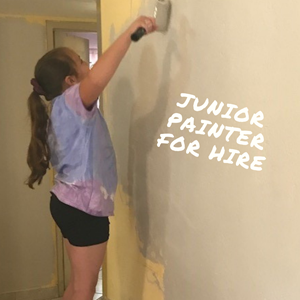I’m sure you’ve all heard of “helicopter parenting.” This is when we as well-meaning parents hover over our children to step in when they need us.
But have you heard of Lawnmower Parenting? Lawnmower Parenting is when parents literally, “mow down” problems for their children, so they don’t have to face them.
Lawnmower parenting has been trending for a bit. From a post by a college professor on the detriment of this behavior, to a high school teacher who went to their school’s office to retrieve a water bottle that a parent had left for their 17-year-old, when water was readily available at school.
I share this not to shame parents - we’re all trying our best - but to stop and ask ourselves the next time we’re asked, or not asked, to step in, “How much is too much when we help our kids?”
Why do we do this? It seems wrong, doesn’t it?
As adults, we understand that we learn through our mistakes. That getting things right every time means we don’t grow or change. Think back to all the obstacles we faced growing up as children and adolescents, and then into adulthood. Those obstacles shaped us into the people we are today.
Yet not one of us as parents hasn’t felt the urge to “lawnmower.” (Is that a verb?)

Here’s why:
Parents – Moms in particular – have the whole guilt thing down. We work too much, we don’t work enough, we missed signs of an illness, we didn’t realize they were lactose-intolerant until they started throwing up at school, and so many other scenarios we repeat in our heads to convince us we’re not doing our best.
If guilt is motivating you, ask yourself if by taking your child back to school every time they leave their homework, (done it!), you’re communicating that you’ll always be there to save them? That if they don’t understand something the teacher said, and you continually ask the question for them, they won’t learn to ask those questions themselves?
You may say, “They’re too young for me to back off.”
And while this is true for very young children, if you have school-age kids, that may not always be the case. Teachers are usually your go-to for the answer. They teach children your exact age year-after-year, and often they interact with your children in ways that you don’t.

My children are 13 and 8. The level of independence that one has is vastly different from the other. However, at both of their school orientations, at two different schools, in two completely different grade levels, their homeroom teachers said virtually the same thing.
“Please let your children solve their problems.”
“We expect them to be independent.”
“Fourth grade is when we stop babying them.”
“If your children have a question on their homework, let them come to us.”
“In high school their teachers want them to advocate for themselves. They need to start getting ready now.”
You see where I’m going.
If they leave their lunch box, provided they don’t have medical dietary needs, school lunch is usually an available option.
If they want to help you cook, supervise them, but let them do it.
If they want to go on an out-of-town school trip without you (yikes!), you don’t always have to chaperone.

The more we step in to help when we shouldn’t, the more we’re communicating to our children that they can’t fix issues themselves, which can negatively impact their self-esteem. We want to empower our children to reach their full potential, whatever that represents for them.
This doesn’t mean you love and support them any less.
All this means is you stop mowing the lawn to let the grass flourish.